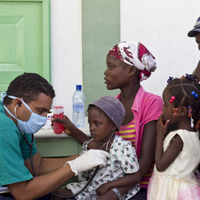Discussions of sharing knowledge for global health initiatives typically conjure images of children afflicted with neglected tropical diseases. Knowledge sharing seems like an important but comfortably distant concern for those in industrialized countries. In fact, far from being localized to diseases endemic to developing countries, the concerns -- and challenges -- of sharing health knowledge are truly global.
Take genomic science, a field with deep relevance to residents of industrialized countries, to whom it promises a future of increasingly personalized medicine. Yet that future of tailored therapy depends on the ability to access the collective building blocks of the human genome. Scientists involved in the publicly funded Human Genome Project understood that need. Therefore, leading genome-sequencing centers funded by the Wellcome Trust and the U.S. National Institutes of Health (NIH) committed to depositing gene sequences -- every 1,000 base pairs -- into a publicly available database, the GenBank, within 24 hours of completing their work. These cross-national norms, called the Bermuda Rules, were intended to prevent the patenting of DNA sequences through defensive publishing. Moreover, consequences were attached to a failure to follow the rules: The NIH suggested that the patenting of work emerging from the publicly funded Human Genome Project would count against one’s likelihood of receiving subsequent funding.
And yet, these funder norms have done little to stem the patenting of genes. To take one example, in Europe and North America, the firm Myriad Genetics is at the center of a fight over the patenting of genes related to the diagnosis of breast and ovarian cancer. Myriad has fought to limit alternative tests of the genetic markers for which it claims patents and has positioned itself to control certain genetic data for breast and ovarian cancer. Arguing that Myriad’s patents “undermine the free exchange of information and scientific freedom,” the American Civil Liberties Union and the Public Patent Foundation at the Benjamin N. Cardozo School of Law have challenged the patent claims over these “products of nature” in U.S. courts.

